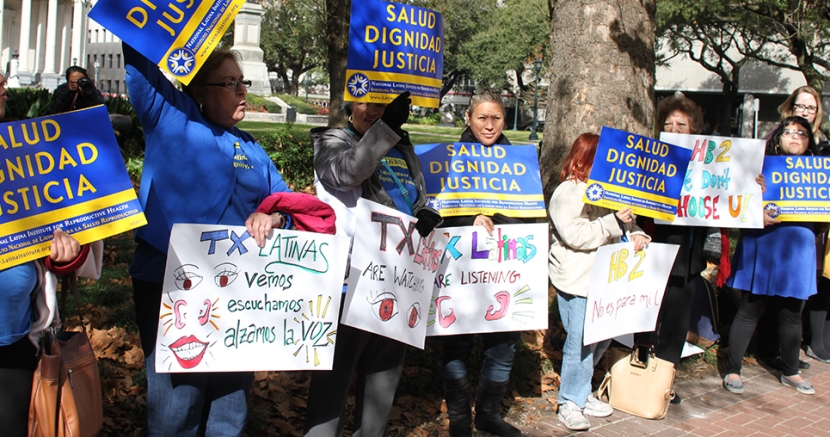Seven Ways Republicans Are Failing Latinas on Reproductive Health Care

Latinas make up more than 40% of women of childbearing age — 2.5 of 5.7 million — in Texas. And by every measure and on every front, from access to contraception and sex education to cancer screenings and abortion care, Texas Latinas experience a disproportionate share of the harm caused by policies that restrict access to reproductive healthcare.
It's not entirely surprising that the divide over these policies is almost entirely among party lines, with a few exceptions. But the health and wellness of Texas women and families shouldn't be about politics.
Let’s count the ways in which Republican policies in Texas are failing Latina women by imposing unacceptably extreme barriers to reproductive healthcare:
-
Lack of Insurance. Texas ranks the highest in the nation — roughly 20% — for its share of uninsured residents. Latinos are more than twice as likely, as compared to whites, to be uninsured in Texas. Approximately 1 in every 3 women of childbearing years (age 15 to 44) in Texas, more than 40% of whom are Latina, has no source of health insurance coverage. And while Democrats are advocating for increased health care coverage, the Republican-led Texas Legislature chose not expand access to Medicaid or close the coverage gap and failed to expand coverage for the uninsured.
-
Family Planning Cuts. In 2011, in an effort to attack Planned Parenthood and abortion access, the Republican-led Texas Legislature slashed funding for family planning clinics by two-thirds. Disproportionately hit by these the cuts were Texas Latinas, particularly those living in poor and rural areas with large immigrant populations like the Rio Grande Valley. Lack of transportation and insurance puts clinics and needed medical services even further out of reach for many Latinas. Nine of the 32 state-funded family planning clinics in the valley shuttered, while others have been forced to reduce services, raise costs, and increase wait times. The situation is even more dire for undocumented women, who cannot travel from their communities due to immigration checkpoints. The Republican-led Texas Legislature has since taken steps to restore funding for family planning services, however "the disruption of services and the dismantling of the provider network caused profound and long-lasting damage to the state’s reproductive health safety net" and the impact of these additional funds has not yet been realized by Latinas in underserved communities.
-
Abortion Restrictions. According to national data analyzed by the National Latina Institute for Reproductive Health (NLIRH), due to transportation, cost, and immigration barriers, Latinas are the least likely of all racial and ethnic groups to travel more than 100 miles to obtain an abortion. The devastating abortion restrictions passed by ideologically driven Republican politicians in House Bill 2 have forced the closure of half the state's abortion clinics, disproportionately impacting Latinas and immigrant women in the Rio Grande Valley and throughout the state who were more likely to rely on these shuttered clinics for abortion care. In 2015, the Republicans in the Texas Legislature went even further, passing abortion restrictions that harm vulnerable Latina youth by dismantling the judicial bypass system and directly target immigrant women by requiring they present specific forms of identification.
-
Cancer Screenings. Texas Latinas are 26% more likely to die of cervical cancer compared to Latinas nationally, and almost 36% more likely to die of cervical cancer than white Texans, per a NLIRH report. Yet instead of passing measures aimed at erdicating these bleak statistics, the Republicans in the Texas Legislature, in another thinly veiled anti-abortion attack, cut Planned Parenthood from its Breast and Cervical Cancer Screening program, reducing access to life saving cancer screenings and leaving many women with few, if any, alternatives for affordable care.
-
Abstinence-Based Sex Education. In Texas, public schools are not required to provide sex education, and if schools choose to provide sex education, it must be abstinence-based. This lack of access to medically accurate sex education disproportionately impacts Latinas who are less likely than white women to receive instruction on birth control methods before age 18. Compared to their white counterparts, Latina youth in Texas have lower contraceptive use rates, higher pregnancy rates, and higher rates of sexually transmitted diseases. The Texas legislature not only failed to move toward comprehensive, evidence-based sex education, but chose to make this critical instruction even more medically inaccurate and biased.
-
Affordable Birth Control. For women who lack insurance coverage, the cost of contraception can pose a prohibitive barrier. Limited access to affordable contraceptive care places women at higher risk of unintended pregnancy. In Texas, Latinas are almost 20% less likely than white women to report a pregnancy as intended. According to data complied by NLIRH, "Texas has more women in need of publicly subsidized contraception than any other state, except California, and...the number of Texas Latinas in need of publicly funded contraception is 1.6 times that of non-Hispanic whites." The Texas legislature did take steps to increase access to FDA-approved contraception last session.
-
Immigration status. Blanco Borrego, an undocumented immigrant and mother of three, was arrested during an appointment at her gynocologist’s office while seeking follow-up care for a cyst. Borrego’s arrest could exacerabte the already untenable situation many immigrant women are faced with in Texas, foregoing necessary medical care — a basic human right — out of fear of deportation. The Texas legislature could take steps to eliviate this barrier by allowing undocumented immigrants to have valid IDs cards, but has failed to do so.
Visit the Texas Latina Advocacy Network of the National Latina Insitute for Reproductive Health to learn more their incredible work organizing in communities most impacted by these devastating policies and building a multi-generation, inclusive movement for reproductive justice in Texas.
DONATE
Your donation supports our media and helps us keep it free of ads and paywalls.








